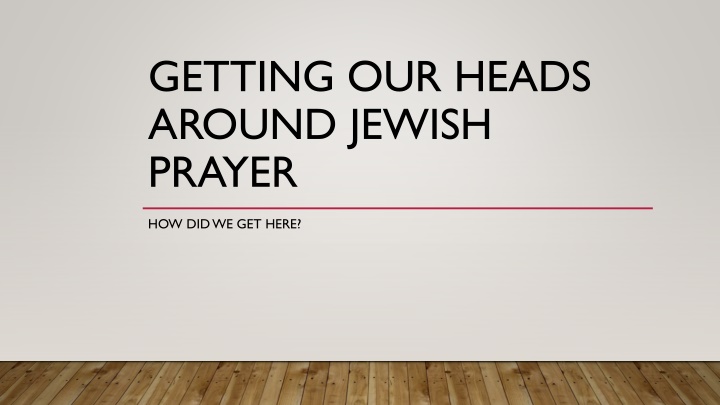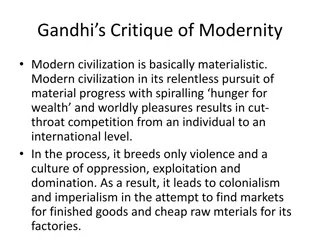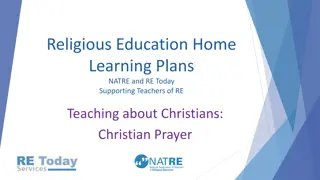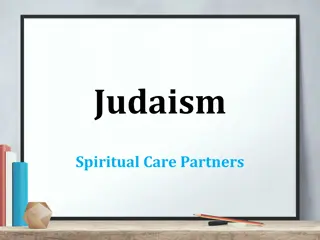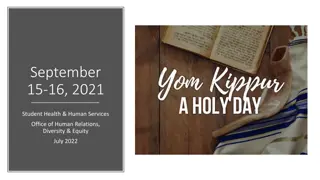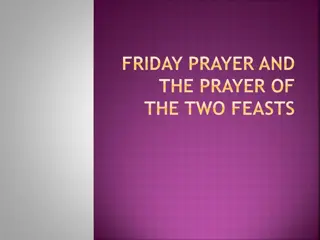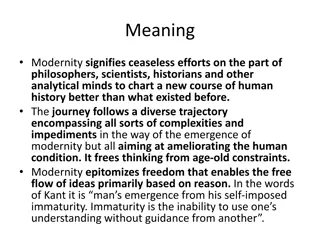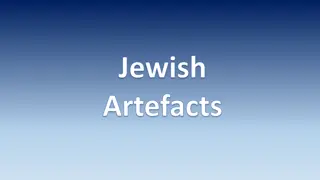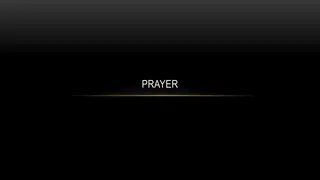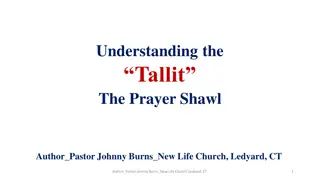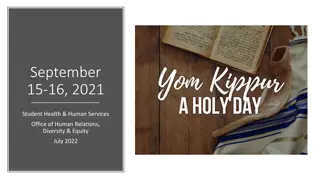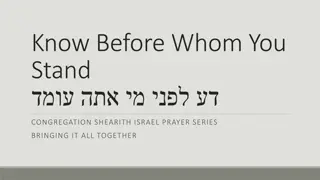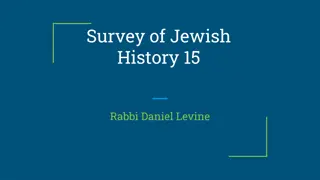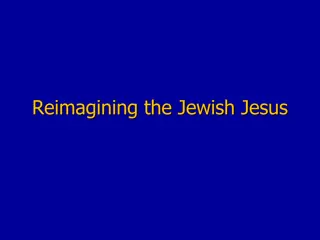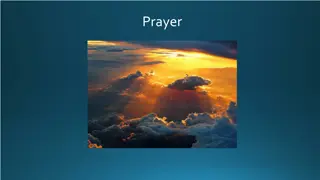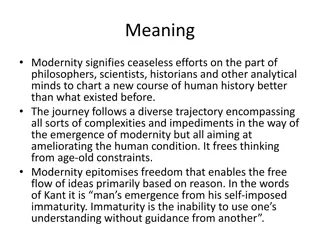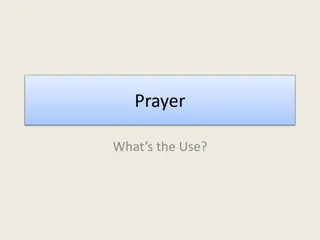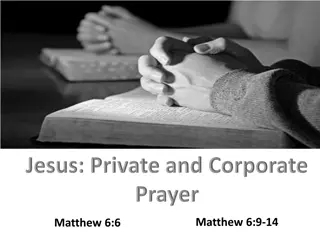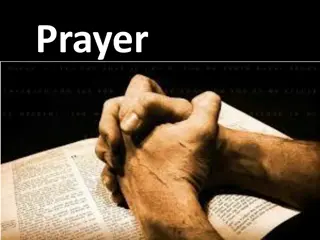Unraveling Jewish Prayer: Tradition and Modernity
Delve into the essence of Jewish prayer, exploring its historical evolution, the significance of the Siddur, the impact of music, and the incorporation of body movements. Examine the connection between ancient sacrificial practices and contemporary prayer services.
Download Presentation

Please find below an Image/Link to download the presentation.
The content on the website is provided AS IS for your information and personal use only. It may not be sold, licensed, or shared on other websites without obtaining consent from the author.If you encounter any issues during the download, it is possible that the publisher has removed the file from their server.
You are allowed to download the files provided on this website for personal or commercial use, subject to the condition that they are used lawfully. All files are the property of their respective owners.
The content on the website is provided AS IS for your information and personal use only. It may not be sold, licensed, or shared on other websites without obtaining consent from the author.
E N D
Presentation Transcript
GETTING OUR HEADS AROUND JEWISH PRAYER HOW DID WE GET HERE?
DEFINING JEWISH PRAYER - To Pray (reflexive) Directing your thoughts and feelings toward a higher power (God) Gratitude/Thanksgiving Awe/Wonder/Connection Contrition/Apology Request/Desire Connecting to the past and future through the recitation of eternal words
WHAT ARE THE GOALS OF THIS COURSE? Getting our heads around Understanding the historical development of Jewish worship from the Bible until today Appreciating the Siddur as the primary tool of modern Jewish worship Recognizing that the Siddur is still developing, and why Getting our hearts into The words are only part of the communal prayer experience. Music is an integral part of getting our hearts in to prayer. We ll learn about the music of prayer, but also we ll sing and practice different modalities Getting our bodies engaged What is the standing and sitting about? How does the choreography work? Concepts like minyan and hitbodedut
SACRIFICE KORBAN
TYPES OF SACRIFICES Type of Sacrifice What is it for? Who enjoys it? Kind of Prayer Olah / Burnt Offering / Zevach Shlamim / Peace or Whole Offering / Chatat / Sin Offering / Submission to God / Recognizing God s Greatness / Wonder Expression of thanks or gratitude Completely Burnt for God Wow / Forgiveness Part is burnt for God / Part is given to Priests / Part is eaten by the whole family Thanksgiving Atone and purge unintentional sins, some are for individual, and some of for communal Atone for stealing from the altar, or if you are unsure what is causing the guilt Eaten by the Cohanim Sorry Eaten by the Cohanim Sorry Asham / Guilt / Mincha / meal offering / Something brought from the fruits of labor Part was burned, most was eaten by the Cohanim Please
HOW DOES THIS CONNECT TO OUR PRAYER TODAY? Part of the Service The number of services Relationship to Tefillah Correspond to the mandatory sacrifices in the Temple Recitation of the different types of sacrifices References to the sacrificial system within the Amidah A custom to reserve the first Aliyot for Cohanim and Levites Preparatory Prayers Amidah Torah Service
AVOT DERABBI NATAN 11A OPENING SECTION OF SIDDUR Once, RabbanYochanan ben Zakkai was walking with his disciple, Rabbi Y'hoshuah, near Jerusalem after the destruction of the Temple. R. Y'hoshua looked at the Temple ruins and said, "Oy for us! The place that atoned for the sins of the people Israel - through animal sacrifice - lies in ruins!" Rabbi Yohanan ben Zakkai spoke to him in comfort, "Do not be too sad, my son. We has another equally meritorious way of gaining atonement - deeds of lovingkindness." For it is written, "Lovingkindness I desire, not sacrifice" (Hosea 6:6). b [ ] .
THE LAWS OF PRAYER HilchotTefillah 1:1 To pray daily is an affirmative duty, as it is said, "And ye shall serve the Lord, your God" (Exodus 23:25). The service, here referred to, according to the teaching of tradition, is Prayer, as it is said, "And to serve Him with all your heart" (Deuteronomy 11:13), on which the sages commented, "What may be described as Service of the Heart? Prayer". The number of prayers is not prescribed in the Torah. No form of prayer is prescribed in the Torah. Nor does the Torah prescribe a fixed time for Prayer. : ) ( . : ( . ) . .
CONNECTING TO GOD THE RIGHT WAY Now Aaron s sons Nadab and Abihu each took his fire pan, put fire in it, and laid incense on it; and they offered before the Lord alien fire, which He had not enjoined upon them.2And fire came forth from the Lord and consumed them; thus they died at the instance of the Lord.3Then Moses said to Aaron, "This is what the Lord meant when He said: Through those near to Me I show Myself holy, And gain glory before all the people." And Aaron was silent.
THE PRAYER OF HANNAH There was a man from Ramathaim of the Zuphites, in the hill country of Ephraim, whose name was Elkanah son of Jeroham son of Elihu son of Tohu son of Zuph, an Ephraimite.2He had two wives, one named Hannah and the other Peninnah; Peninnah had children, but Hannah was childless.3This man used to go up from his town every year to worship and to offer sacrifice to the Lord of Hosts at Shiloh. Hophni and Phinehas, the two sons of Eli, were priests of the Lord there. 4One such day, Elkanah offered a sacrifice. He used to give portions to his wife Peninnah and to all her sons and daughters;5but to Hannah he would give one portion only though Hannah was his favorite for the Lord had closed her womb.6Moreover, her rival, to make her miserable, would taunt her that the Lord had closed her womb.7This happened year after year: Every time she went up to the House of the Lord, the other would taunt her, so that she wept and would not eat.8Her husband Elkanah said to her, Hannah, why are you crying and why aren t you eating? Why are you so sad? Am I not more devoted to you than ten sons? 9After they had eaten and drunk at Shiloh, Hannah rose. The priest Eli was sitting on the seat near the doorpost of the temple of the Lord. 10In her wretchedness, she prayed to the Lord, weeping all the while.11And she made this vow: O Lord of Hosts, if You will look upon the suffering of Your maidservant and will remember me and not forget Your maidservant, and if You will grant Your maidservant a male child, I will dedicate him to the Lord for all the days of his life; and no razor shall ever touch his head.
THE PRAYER OF HANNAH 12As she kept on praying before the Lord, Eli watched her mouth.13Now Hannah was praying in her heart; only her lips moved, but her voice could not be heard. So Eli thought she was drunk.14Eli said to her, How long will you make a drunken spectacle of yourself? Sober up! 15And Hannah replied, Oh no, my lord! I am a very unhappy woman. I have drunk no wine or other strong drink, but I have been pouring out my heart to the Lord.16Do not take your maidservant for a worthless woman; I have only been speaking all this time out of my great anguish and distress. 17 Then go in peace, said Eli, and may the God of Israel grant you what you have asked of Him. 18She answered, You are most kind to your handmaid. So the woman left, and she ate, and was no longer downcast.19Early next morning they bowed low before the Lord, and they went back home to Ramah. Elkanah knew his wife Hannah and the Lord remembered her.20Hannah conceived, and at the turn of the year bore a son. She named him Samuel, meaning, I asked the Lord for him.
THE PRAYER OF RABBI ELAZAR Brachot 16b The Gemara describes how after Rabbi Elazar concluded his prayer, he said the following additional prayer: May it be Your will, Lord our God, to cause to dwell in our lot love and brotherhood, peace and friendship. And may You make our borders rich in disciples and cause us to ultimately succeed, that we will have a good end and hope. And may You set our portion in the Garden of Eden, and may You establish for us a good companion and a good inclination in Your world. And may we rise early and find the aspiration of our hearts to fear Your name, and may the satisfaction of our souls come before You, i.e., may You hear our prayers that we may have spiritual contentment in this world for the best. ''
THE PRAYER OF RABBI YOCHANAN Brachot 16b after Rabbi Yo anan concluded his prayer, he said the following additional prayer: May it be Your will, Lord our God, that You look upon our shame and behold our plight, that You clothe Yourself in Your mercy, and cover Yourself with Your might, that You wrap Yourself in Your loving-kindness, and gird Yourself with Your grace, and may Your attributes of goodness and humility come before You. ''
THE PRAYER OF RABBI ZEIRA Brachot 16b Similarly, after Rabbi Zeira concluded his prayers he said the following additional prayer: May it be Your will, Lord our God, that we not sin or shame ourselves, and that we not disgrace ourselves before our forefathers, in the sense that our actions should not disgrace the actions of our forefathers. ''
THE PRAYER OF RAV HIYYA Brachot 16b After Rabbi iyya prayed he said the following: May it be Your will, Lord our God, that Your Torah should be our vocation, and may our heart not become faint nor our eyes dim. After his prayer, Rav said the following: May it be Your will, Lord our God, that You grant us long life, a life of peace, a life of goodness, a life of blessing, a life of sustenance, a life of freedom of movement from place to place, where we are not tied to one place, a life of dread of sin, a life without shame and disgrace, a life of wealth and honor, a life in which we have love of Torah and reverence for Heaven, a life in which You fulfill all the desires of our heart for good. ''
THE PRAYER OF RABBI YEHUDAH HANASI Brachot 16b After his prayer, RabbiYehuda HaNasi said the following: May it be Your will, Lord our God, and God of our forefathers, that You save us from the arrogant and from arrogance in general, from a bad man, from a bad mishap, from an evil instinct, from a bad companion, from a bad neighbor, from the destructive Satan, from a harsh trial and from a harsh opponent, whether he is a member of the covenant, a Jew, or whether he is not a member of the covenant. And the Gemara notes that Rabbi Yehuda HaNasi would recite this prayer every day despite the fact that royal officers stood watch over RabbiYehuda HaNasi for his protection; nevertheless, he prayed to avoid conflict or hindrance resulting from arrogance ''
THE PRAYER OF RABBI SAFRA Brachot 16b After his prayer, Rav Safra said the following: May it be Your will, Lord our God, that You establish peace in the heavenly entourage [pamalia] of angels each of whom ministers to a specific nation (see Daniel 10), and whose infighting causes war on earth; and in the earthly entourage, the Sages, and among the disciples engaged in the study of Your Torah, whether they engage in its study for its own sake or not for its own sake. And all those engaged in Torah study not for its own sake, may it beYour will that they will come to engage in its study for its own sake. ''
THE PRAYER OF RABBI ALEXANDRI OR RABBI HAMUNA Brachot 16b '' After his prayer, Rabbi Alexandri said the following: May it be Your will, Lord our God, that You station us in a lighted corner and not in a darkened corner, and do not let our hearts become faint nor our eyes dim. Some say that this was the prayer that Rav Hamnuna would recite
THE PRAYER OF RABBI HAMNUNA OR ALEXANDRI s '' Some say that this was the prayer that Rav Hamnuna would recite, and that after Rabbi Alexandri prayed, he would say the following: Master of the Universe, it is revealed and known before You that our will is to perform Your will, and what prevents us? On the one hand, the yeast in the dough, the evil inclination that is within every person; and the subjugation to the kingdoms on the other. May it be Your will that You will deliver us from their hands, of both the evil inclination and the foreign kingdoms, so that we may return to perform the edicts of Your will with a perfect heart.
THE PRAYER OF RABBI HAMNUNA OR ALEXANDRI s '' Some say that this was the prayer that Rav Hamnuna would recite, and that after Rabbi Alexandri prayed, he would say the following: Master of the Universe, it is revealed and known before You that our will is to perform Your will, and what prevents us? On the one hand, the yeast in the dough, the evil inclination that is within every person; and the subjugation to the kingdoms on the other. May it be Your will that You will deliver us from their hands, of both the evil inclination and the foreign kingdoms, so that we may return to perform the edicts of Your will with a perfect heart.
THE LAWS OF PRAYER HilchotTefillah 1:5 Thus, too, they ordained that the Services of Prayer should be equal in number to the Sacrifices two services of prayer daily, corresponding to the two daily offerings. And for the day on which an additional offering was ordained, they instituted a third prayer, corresponding to the additional offering. The Service which corresponds to the daily morning sacrifice is called the Morning Prayer. The Service which corresponds to the Afternoon Sacrifice is called the Afternoon Prayer, and the Service corresponding to the Additional offering is called the Additional Prayer. : . . . . :
THE LAWS OF PRAYER Hilchot Tefillah 1:6 So also they ordained that a person should recite one service of Prayer at night, since the portions of the animal offered up as the Afternoon Sacrifice were consumed on the altar throughout the night, as it is said, "This is the law of the burnt offering; this it is that which goeth up on its firewood upon the altar all night" (Leviticus 6:2). And in this sense it is said, "Evening and morning and at noon will I meditate and cry aloud, and He hath heard my voice" (Psalms 55:18). The Evening Service is not obligatory like the Morning and Afternoon Services. Nevertheless all Israelites, wherever they have settled, have adopted the practice of reciting the Evening Service and have accepted it as obligatory. : ) ) . : ( , ( .
RETURN TO TEMPLE WORSHIP Be pleased, Lord our God, with Your people Israel and with their prayer, and restore the service to Your Holy Temple / Holy of Holies; be pleased to receive the prayers and fire offerings of the people of Israel in love. May the service of Your people Israel always be acceptable to You. . . : ' .
WHY DO WE PRAY TO RETURN TO ANIMAL SACRIFICE?
WOW Siddur Ashkenaz, Weekday, Shacharit, Preparatory Prayers, Asher Yatzar 1 , , , , Blessed are You, Lord our G-d, Ruler of the Universe, who created the human being with wisdom, and created in them many openings and spaces. It is revealed and known before your holy throne that if one of them is opened or closed, it would be impossible to exist and to stand before you. Blessed are you, G-d, who heals all flesh and does wonders. . ' ' : :
